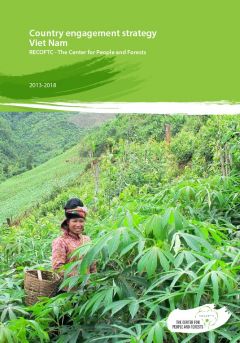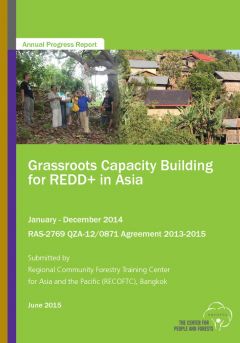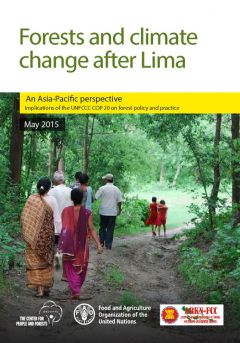Location
RECOFTC
RECOFTC is derived from an abbreviated form of the organization's legal name, Regional Community Forestry Training Center for Asia and the Pacific. Formerly the organization was known as RECOFTC – The Center for People and Forests.
RECOFTC – The Center for People and Forests is an international not-for-profit organization that focuses on capacity building for community forestry in the Asia Pacific region. It advocates for the increased involvement of local communities living in and around forests - some 450 million people in Asia-Pacific - in the equitable and ecologically sustainable management of forest landscapes.
The Regional Community Forestry Training Center for Asia and the Pacific (RECOFTC) opened in Bangkok, Thailand, in March 1987 with support from the United Nations Food and Agriculture Organization, the Government of Switzerland (through the Asian Development Bank), and Thailand's Kasetsart University.
Community forestry is widely acknowledged as a powerful solution for many of the challenges facing local people and the wider society, especially in improving rural livelihoods, enhancing community governance and empowerment, transforming forest-related conflict, protecting and enhancing the environment, and helping to fight climate change. As a capacity-building organisation, RECOFTC improves the ability of people and organisations to conduct community forestry effectively and sustainably.
RECOFTC works toward its mission through four thematic areas:
- expanding community forestry
- people, forests and climate change
- transforming forest conflict
- securing local livelihoods.
Members:
Resources
Displaying 171 - 175 of 485Building Blocks for Viable Community Forestry Enterprises
Research shows that community forestry enterprises (CFE) in community forestry (CF) sites are restricted due to a number of factors: a lack of support by governments, combined with policies that undermine CFE’s viability; misconceptions by governments that communities are unable to manage forests in a sustainable manner; and regulatory framework that favours private sector and state forest enterprises. These restrictions prevent CF members from developing and commercializing forest products, thereby only allowing them to benefit from their forests through a subsistence approach.
RECOFTC Country Engagement Strategy - Viet Nam
Two-thirds of Viet Nam's land area of 33 million ha is mountainous. Almost half of the land area is classified as forest, with one-quarter of Viet Nam's 90 million people living near or in forest lands. Many of them belong to 53 ethnic minority groups. There is a high correlation between the incidence of poverty and forests. Forest tenure reforms initiated in the 1990s, have resulted in considerable diversification of tenure arrangements, with almost 30 percent of the forest land under management by local people, either by individual households or village communities.
How Can We Address Deforestation and Meet National Targets for Community Forestry in ASEAN?
The ASFN and RECOFTC report 'The current status of social forestry in climate change adaptation and mitigation in the ASEAN Region' offers insights on national forestry data and information on forest cover and areas managed by local people in ASEAN countries. These infographics provide snapshots of key data presented in the report in national languages. They summarize the current status of community forestry in Cambodia, Indonesia, Lao PDR, Myanmar, Thailand and Viet Nam and offer recommendations for effective development of policies and management.
Grassroots Capacity Building for REDD+ in Asia
This annual progress report highlights key achievements and lessons learned of the Grassroots Capacity Building for REDD+ in Asia project during 2014.
Forests and Climate Change after Lima
The outcomes of COP 20 are expected to have a significant impact on developments in the field of forests and climate change over the coming year. In view of this, forest sector stakeholders in Asia and the Pacific require succinct and accurate information on the implications of the COP 20 discussions and their significance to forest policy decisions and practice.






